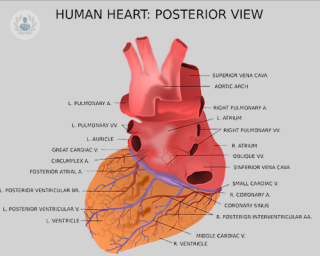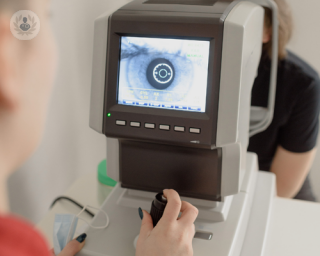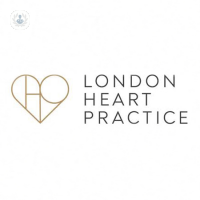What is cardiovascular disease?
Cardiovascular disease (CVD) is a group of disorders that affect the heart and the blood vessels. It is associated with the build-up of fatty deposits in the arteries, which is known as atherosclerosis. It often involves hypertension, which can be both a cause and result of CVD. The disorder is one of the main causes of death in the UK yet can often be prevented with a healthy lifestyle.

What are the different types of cardiovascular diseases?
The four main types of cardiovascular disease are:
- Coronary heart disease – occurs when the flow of blood to the heart is blocked. It can lead to angina, heart attacks or heart failure.
- Strokes and TIAs – the blood supply of the brain is cut off during a stroke. A transient ischaemic attack is similar but the blood flow to the brain is only temporary.
- Peripheral arterial disease – occurs when there is a blockage in the arteries to the limbs, such as the legs.
- Aortic diseases – these are a group of conditions affecting the aorta, the largest blood vessel in the body that carries blood from the heart to the rest of the body. The commonest type is an aortic aneurysm.
What are the causes of cardiovascular disease?
There are many things are risk factors and increase the chance of a person developing CVD. These include:
- Hypertension – if blood pressure is too high, this can damage the blood vessels
- Smoking – the harmful tobacco substances can narrow the blood vessels
- High cholesterol – the fatty substance in the blood can increase the chance of developing a blood clot
- Diabetes – high blood sugar levels can damage the blood vessels
- Lack of regular exercise – staying active helps promote good heart health.
- Obesity – being overweight or obese increases the chance of developing diabetes and hypertension, which are both risk factors for CVD
- Family history – having a family history of the disease means that the risk of developing CVD is increased
Other risk factors for cardiovascular disease
The other factors that can affect the development of CVD are:
- Age
- Gender
- Poor diet
- Alcohol consumption
How can cardiovascular disease be prevented?
Living a healthy lifestyle can prevent and lower the risk of cardiovascular disease. This means:
- Stop smoking
- Eating a balanced diet
- Exercising regularly
- Reaching and maintaining a healthy weight
- Reducing alcohol intake
- Medication
Cardiovascular disease
Dr Francesco Lo Giudice - Cardiology
Created on: 10-14-2013
Updated on: 06-12-2023
Edited by: Sophie Kennedy
What is cardiovascular disease?
Cardiovascular disease (CVD) is a group of disorders that affect the heart and the blood vessels. It is associated with the build-up of fatty deposits in the arteries, which is known as atherosclerosis. It often involves hypertension, which can be both a cause and result of CVD. The disorder is one of the main causes of death in the UK yet can often be prevented with a healthy lifestyle.

What are the different types of cardiovascular diseases?
The four main types of cardiovascular disease are:
- Coronary heart disease – occurs when the flow of blood to the heart is blocked. It can lead to angina, heart attacks or heart failure.
- Strokes and TIAs – the blood supply of the brain is cut off during a stroke. A transient ischaemic attack is similar but the blood flow to the brain is only temporary.
- Peripheral arterial disease – occurs when there is a blockage in the arteries to the limbs, such as the legs.
- Aortic diseases – these are a group of conditions affecting the aorta, the largest blood vessel in the body that carries blood from the heart to the rest of the body. The commonest type is an aortic aneurysm.
What are the causes of cardiovascular disease?
There are many things are risk factors and increase the chance of a person developing CVD. These include:
- Hypertension – if blood pressure is too high, this can damage the blood vessels
- Smoking – the harmful tobacco substances can narrow the blood vessels
- High cholesterol – the fatty substance in the blood can increase the chance of developing a blood clot
- Diabetes – high blood sugar levels can damage the blood vessels
- Lack of regular exercise – staying active helps promote good heart health.
- Obesity – being overweight or obese increases the chance of developing diabetes and hypertension, which are both risk factors for CVD
- Family history – having a family history of the disease means that the risk of developing CVD is increased
Other risk factors for cardiovascular disease
The other factors that can affect the development of CVD are:
- Age
- Gender
- Poor diet
- Alcohol consumption
How can cardiovascular disease be prevented?
Living a healthy lifestyle can prevent and lower the risk of cardiovascular disease. This means:
- Stop smoking
- Eating a balanced diet
- Exercising regularly
- Reaching and maintaining a healthy weight
- Reducing alcohol intake
- Medication


Angina: when is it serious?
By Dr Dwayne Conway
2024-12-26
We invited highly esteemed consultant interventional and general cardiologist Dr Dwayne Conway to shed light on how cardiovascular health and angina symptoms relate to heart attack risk. The revered specialist also reveals the most important risk factors associated with heart attack risk and the lifestyle measures which can improve heart health most significantly. See more


Do I need to worry about a stabbing pain in my chest?
By Dr Pierluigi Costanzo
2024-12-26
Highly esteemed consultant cardiologist Dr Pierluigi Costanzo offers reassurance and advice about what to do when experiencing pain in the chest and when to see a medical specialist. See more


Retinal vein occlusion and how it’s treated
By Mrs Kapka Nenova
2024-12-26
What's involved in retinal vein occlusion treatment? We speak to Mrs Kapka Nenova, a renowned consultant ophthalmologist, all about it, as well as it’s severity, risk factors related to the condition and symptoms. See more


Worried about your heart health? Expert guidance on when to see a specialist
By Dr Eileen Peat
2024-12-26
Highly respected consultant cardiologist Dr Eileen Peat offers invaluable advice on keeping the heart healthy in this informative article and also details when to see a doctor about any concerns. See more
Experts in Cardiovascular disease
-
Mr Ulrich Rosendahl
Cardiothoracic surgeryExpert in:
- Aortic valve replacement
- Transcatheter aortic valve implantation (TAVR)
- Mitral regurgitation
- Cardiovascular disease
- Heart valve surgery
- Minimally invasive cardiac surgery
-
Dr Andrew Deaner
CardiologyExpert in:
- Valvular heart disease
- Heart failure
- Palpitations
- Pacemaker
- Echocardiogram
- Coronary angioplasty
-
Professor Mark Gallagher
CardiologyExpert in:
- Atrial fibrillation ablation
- Arrhythmia
- Cardiac resynchronisation therapy
- Defibrillator
- Cardiovascular disease
- Cardiac arrest
-
Professor James Spratt
CardiologyExpert in:
- Coronary heart disease
- Coronary angioplasty
- Family history of heart disease
- Minimally invasive techniques
- Interventional cardiology
- Cardiovascular disease
-
Professor Peter Groves
CardiologyExpert in:
- Cardiovascular disease
- Heart check up
- Congenital heart disease
- Valvular heart disease
- See all

77 Wimpole Street
77 Wimpole Street
77 Wimpole Street, London. W1G 9RU
No existe teléfono en el centro.
By using the telephone number provided by TOP DOCTORS, you automatically agree to let us use your phone number for statistical and commercial purposes. For further information, read our Privacy Policy
Top Doctors

The Runnymede Hospital - part of Circle Health Group
The Runnymede Hospital - part of Circle Health Group
Guildford Street, Ottershaw, Lyne, Chertsey KT16 0RQ
No existe teléfono en el centro.
By using the telephone number provided by TOP DOCTORS, you automatically agree to let us use your phone number for statistical and commercial purposes. For further information, read our Privacy Policy
Top Doctors

London Heart Practice (HCA)
London Heart Practice (HCA)
78 Harley St, London W1G 7HJ, United Kingdom
No existe teléfono en el centro.
By using the telephone number provided by TOP DOCTORS, you automatically agree to let us use your phone number for statistical and commercial purposes. For further information, read our Privacy Policy
Top Doctors
-
77 Wimpole Street
77 Wimpole Street, London. W1G 9RU, W1G Marylebone LondonExpert in:
- Homecare
- Cardiology
- Preventive cardiology
- Cardiovascular disease
- Respiratory diseases
- Hypertension
-
The Runnymede Hospital - part of Circle Health Group
Guildford Street, Ottershaw, Lyne, Chertsey KT16 0RQ, ChertseyExpert in:
- Cardiology
- Hand surgery
- General Surgery
- Maxillofacial Surgery
- Oral surgery
- Orthopaedic surgery
-
London Heart Practice (HCA)
78 Harley St, London W1G 7HJ, United Kingdom, Central LondonExpert in:
- Cardiology
- Preventive cardiology
- Chest pain
- Cardiovascular disease
- Palpitations
- Coronary CT
- See all
- Most viewed diseases, medical tests, and treatments
- Narcolepsy
- Snoring
- Polysomnography (sleep study)
- Alzheimer's disease
- Chronic headache
- Electrophysiology study
- Autoimmune diseases
- Joint pain
- Nutrition
- Genetic testing








